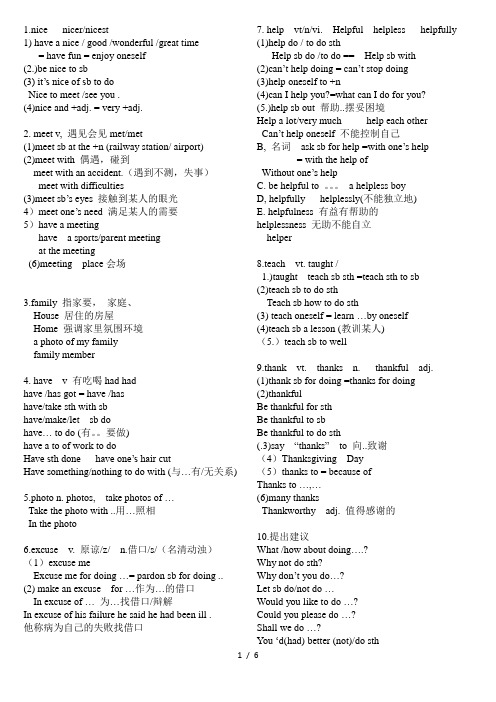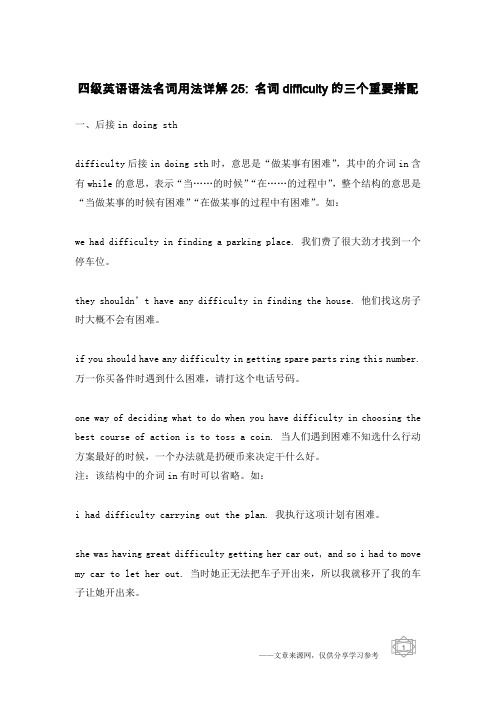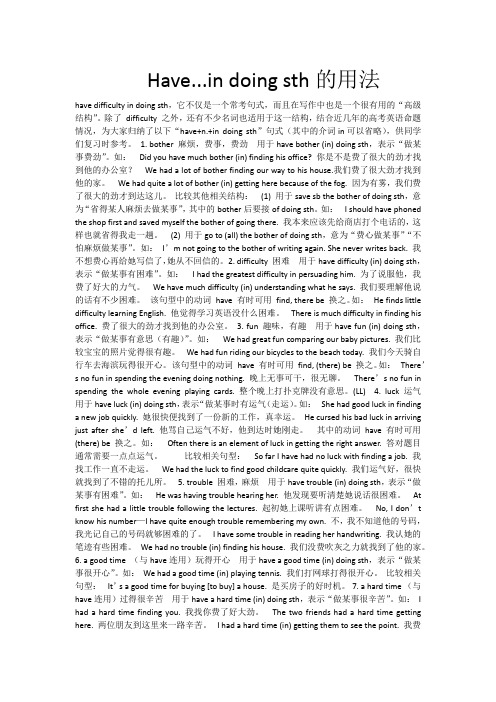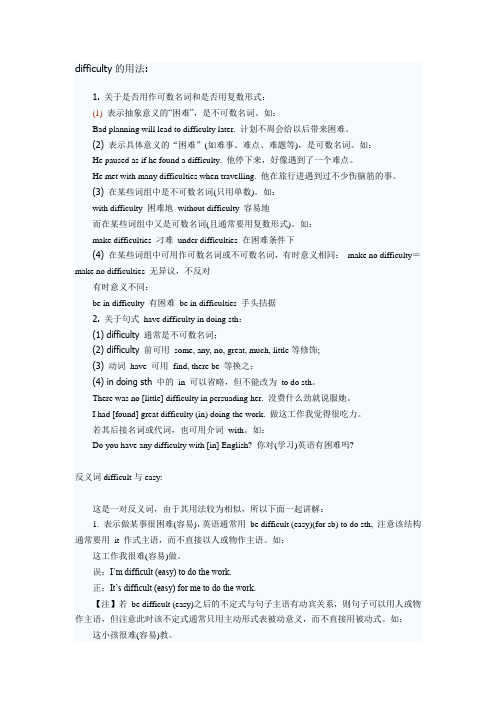difficulty用法
- 格式:doc
- 大小:24.50 KB
- 文档页数:1

1.nice nicer/nicest1) have a nice / good /wonderful /great time= have fun = enjoy oneself(2.)be nice to sb(3) it’s nice of sb to doNice to meet /see you .(4)nice and +adj. = very +adj.2. meet v, 遇见会见met/met(1)meet sb at the +n (railway station/ airport)(2)meet with 偶遇,碰到meet with an accident.(遇到不测,失事)meet with difficulties(3)meet sb’s eyes 接触到某人的眼光4)meet one’s need 满足某人的需要5)have a meetinghave a sports/parent meetingat the meeting(6)meeting place会场3.family 指家要,家庭、House 居住的房屋Home 强调家里氛围环境a photo of my familyfamily member4. have v 有吃喝had hadhave /has got = have /hashave/take sth with sbhave/make/let sb dohave… to do (有。
要做)have a to of work to doHave sth done have one’s hair cutHave something/nothing to do with (与…有/无关系) 5.photo n. photos, take photos of …Take the photo with ..用…照相In the photo6.excuse v. 原谅/z/ n.借口/s/(名清动浊)(1)excuse meExcuse me for doing …= pardon sb for doing .. (2) make an excuse for …作为…的借口In excuse of …为…找借口/辩解In excuse of his failure he said he had been ill .他称病为自己的失败找借口7. help vt/n/vi. Helpful helpless helpfully (1)help do / to do sthHelp sb do /to do == Help sb with(2)can’t help doing = can’t stop doing(3)help oneself to +n(4)can I help you?=what can I do for you?(5.)help sb out 帮助..摆妥困境Help a lot/very much help each other Can’t help oneself 不能控制自己B, 名词ask sb for help =with one’s help= with the help ofWithout one’s helpC. be helpful to 。

四级英语语法名词用法详解25: 名词difficulty的三个重要搭配一、后接in doing sthdifficulty后接in doing sth时,意思是“做某事有困难”,其中的介词in含有while的意思,表示“当……的时候”“在……的过程中”,整个结构的意思是“当做某事的时候有困难”“在做某事的过程中有困难”。
如:we had difficulty in finding a parking place. 我们费了很大劲才找到一个停车位。
they shouldn’t have any difficulty in finding the house. 他们找这房子时大概不会有困难。
if you should have any difficulty in getting spare parts ring this number. 万一你买备件时遇到什么困难,请打这个电话号码。
one way of deciding what to do when you have difficulty in choosing the best course of action is to toss a coin. 当人们遇到困难不知选什么行动方案最好的时候,一个办法就是扔硬币来决定干什么好。
注:该结构中的介词in有时可以省略。
如:i had difficulty carrying out the plan. 我执行这项计划有困难。
she was having great difficulty getting her car out, and so i had to move my car to let her out. 当时她正无法把车子开出来,所以我就移开了我的车子让她开出来。
另外,若difficulty后没有出现动名词,而是接名词,则要用with sth。
如:some people had difficulty with the lecture, but most understood. 有些人听讲有困难,但大部分人听懂了。

艰难度日英语一、单词1. struggle- 英语释义:to make forceful or violent efforts to get free of restraint or constriction; to strive to achieve or attain something in the face of difficulty or resistance.- 用法:可作不及物动词,如struggle to do sth.(努力做某事);也可作名词,如a struggle for survival(为生存的挣扎)。
- 双语例句:- He struggles to make ends meet every month.(他每月都艰难地维持收支平衡。
)- The small business is in a struggle for existence.(这个小生意正在艰难求生。
)2. endure- 英语释义:to bear (pain, suffering, etc.) patiently; to tolerate.- 用法:及物动词或不及物动词,endure sth.(忍受某事)或者endure withoutplaining(毫无怨言地忍受)。
- 双语例句:- She has to endure great hardship to support her family.(为了养家她不得不忍受巨大的困苦。
)- They endured through the long winter.(他们熬过了漫长的冬天。
)3. tough- 英语释义:difficult to endure; hard.- 用法:可作形容词修饰名词,如a tough life(艰难的生活);也可用于It is tough (for sb.) to do sth.(对某人来说做某事很艰难)的句型中。
- 双语例句:- It is a tough time for the unemployed.(对失业者来说这是艰难的时期。

Have...in doing sth的用法have difficulty in doing sth,它不仅是一个常考句式,而且在写作中也是一个很有用的“高级结构”。
除了difficulty 之外,还有不少名词也适用于这一结构,结合近几年的高考英语命题情况,为大家归纳了以下“have+n.+in doing sth”句式(其中的介词in可以省略),供同学们复习时参考。
1. bother 麻烦,费事,费劲用于have bother (in) doing sth,表示“做某事费劲”。
如:Did you have much bother (in) finding his office? 你是不是费了很大的劲才找到他的办公室?We had a lot of bother finding our way to his house.我们费了很大劲才找到他的家。
We had quite a lot of bother (in) getting here because of the fog. 因为有雾,我们费了很大的劲才到达这儿。
比较其他相关结构:(1) 用于save sb the bother of doing sth,意为“省得某人麻烦去做某事”,其中的bother后要接of doing sth。
如:I should have phoned the shop first and saved myself the bother of going there. 我本来应该先给商店打个电话的,这样也就省得我走一趟。
(2) 用于go to (all) the bother of doing sth,意为“费心做某事”“不怕麻烦做某事”。
如:I’m not going to the bother of writing again. She never writes back. 我不想费心再给她写信了,她从不回信的。

difficulty的用法:1. 关于是否用作可数名词和是否用复数形式:(1) 表示抽象意义的“困难”,是不可数名词。
如:Bad planning will lead to difficulty later. 计划不周会给以后带来困难。
(2) 表示具体意义的“困难”(如难事、难点、难题等),是可数名词。
如:He paused as if he found a difficulty. 他停下来,好像遇到了一个难点。
He met with many difficulties when travelling. 他在旅行进遇到过不少伤脑筋的事。
(3) 在某些词组中是不可数名词(只用单数)。
如:with difficulty 困难地without difficulty 容易地而在某些词组中又是可数名词(且通常要用复数形式)。
如:make difficulties 刁难under difficulties 在困难条件下(4) 在某些词组中可用作可数名词或不可数名词,有时意义相同:make no difficulty=make no difficulties 无异议,不反对有时意义不同:be in difficulty 有困难be in difficulties 手头拮据2. 关于句式have difficulty in doing sth:(1) difficulty 通常是不可数名词;(2) difficulty 前可用some, any, no, great, much, little等修饰;(3) 动词have 可用find, there be 等换之;(4) in doing sth 中的in 可以省略,但不能改为to do sth。
There was no [little] difficulty in persuading her. 没费什么劲就说服她。
I had [found] great difficulty (in) doing the work. 做这工作我觉得很吃力。

1. able 用法:be able to doNote: 反义词unable表示不能,而disabled表示残疾的。
be able to do可以表示经过艰难困苦才能做到的事。
2. abroad 用法:表示到(在)国外,是一个副词,前面不加介词。
Note: 可以说from abroad, 表示从国外回来。
3. admit 用法:表示承认的时候后面要加上动名词形式。
Note: 表示允许进入的时候与介词to搭配。
4. advise 用法:advise sb. to do; advise doingNote: 后面的宾语从句要用虚拟语气。
即:advise that sb. (should) do的形式。
5. afford 用法:通常与动词不定式搭配使用。
Note: 前面需要有be able to或can等词。
6. after 用法:表示在时间、空间之后;be after表示追寻。
Note: 用在将来时的时候后面接一时间点,而in接一个时间段,如:after 3 o’clock; in 3 days.7. agree 用法:与介词on, to, with及动词不定式搭配。
Note: agree on表示达成一致;agree to表示批准;agree with表示同意某人说的话。
8. alive 用法:表语性形容词,在句中只能作表语,不能作定语。
Note: 可以作状语使用,表示活活地,如:bury alive.9. allow 用法:allow doing; allow sb. to doNote: 可以表示允许进入,如:Please allow me in.10. among 用法:用在三者或三者以上的群体中。
Note: 还可以表示其中之一,如:He is among the best.11. and 用法:用于连接两个词、短语、句子或其他相同结构。
Note: 与祈使句搭配时往往可以表示条件。
如:Work hard, you’ll succeed sooner or later.12. another 用法:表示又一个,泛指,相当于one more的含义。
表语从句英语教案句子的表语是由一个句子充当的,那么这个充当表语的句子就叫做表语从句。
一起看看表语从句英语教案!欢送查阅!表语从句英语教案1系动词1. 最常用连系动词:be(am; is/was; are/were)。
2. 表变化的系动词:get; turn; go; fall; become; grow; come; run。
用法注意:在英语中,系动词一般只有一般现在时和一般过去时两种时态变化形式,没有其他时态变化形式。
但表变化的这类系动词除外,它们有各种时态变化。
eg: it is becoming colder and colder.the food has gone bad.此处还需注意的是become和turn后接表职业的名词时冠词的有无:eg: two years later, he became a teacher.但two years later, he turned teacher.另外,go表变化时一般指事情向消极、不好的方面转化。
3. 所谓“感官动词〞:look; sound; taste; smell; feel。
一般它们在句子中译成:。
起来;。
上去。
此类系动词为高考高频词。
eg: the food tasted good.食物尝起来很香。
其中必须注意到它们本身也用作实义动词,所以在平常的教学和应用中一定多比拟、关注它们的用法。
eg: he looked sadly at the picture. / she looked sad after hearing the news.tom tasted the food and it tasted good.4. 表状态的系动词:keep; stay; remain;(依然是;保持)eg: she remains loyal to her father despite his cruelty towards her. what a lovely day today! i love fine weather and i hope it will stay fine for some more days.much remains to be done.5. 表像系动词:seem; appear。
名词difficulty的三个重要搭配一、后接in doing sthdifficulty后接in doing sth时,意思是“做某事有困难”,其中的介词in含有while的意思,表示“当……的时候”“在……的过程中”,整个结构的意思是“当做某事的时候有困难”“在做某事的过程中有困难”。
如:We had difficulty in finding a parking place. 我们费了很大劲才找到一个停车位。
They shouldn’t have any difficulty in finding the house. 他们找这房子时大概不会有困难。
If you should have any difficulty in getting spare parts ring this number. 万一你买备件时遇到什么困难,请打这个电话号码。
One way of deciding what to do when you have difficulty in choosing the best course of action is to toss a coin. 当人们遇到困难不知选什么行动方案最好的时候,一个办法就是扔硬币来决定干什么好。
注:该结构中的介词in有时可以省略。
如:I had difficulty carrying out the plan. 我执行这项计划有困难。
She was having great difficulty getting her car out, and so I had to move my car to let her out. 当时她正无法把车子开出来,所以我就移开了我的车子让她开出来。
另外,若difficulty后没有出现动名词,而是接名词,则要用with sth。
如:Some people had difficulty with the lecture, but most understood. 有些人听讲有困难,但大部分人听懂了。
非谓语动词特殊用法:一.以下情况用不定式:①.sth. be adj(hard\difficult\easy\heavy) to do The question is difficult to answer.②.sb. have sth. to do I have a lot of work to do.③.There be sth. to do\to be done There is nothing to talk about.④.find (think\feel\consider\make\believe)it adj to do sth⑤There is no need to do.⑥一般介词后面不可用不定式作宾语,〔except, but除外〕He has no choice but to lie down and sleep. She did nothing but cry.注:不定式作结果/程度状语常见五种结构:①so….as to do 如此…以致②such…as to do如此…以致③enough(…)to do 足以④too…to do… 太…而不能⑤only to do 结果/未曾料到------做了某事二.在“have difficulty (trouble, problem, a hard time, fun, a good time) (+in) + doing;be busy (in) +doing;There is no point (in) + doing〞等结构中,in常要省去。
The children are busy doing their homework.孩子们忙于做作业。
There is no point (in) making the simple experiments once again.再做一次这种简单的实验是毫无意义的。
三.在〔be〕worth后面只能用-ing的主动态来表示被动意义。